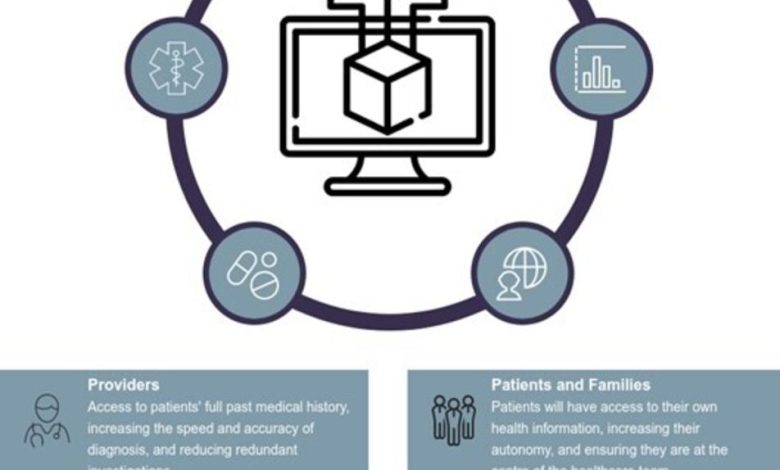Blockchain in Healthcare: Improving Patient Data Security

- Understanding Blockchain Technology in Healthcare
- The Importance of Patient Data Security in the Healthcare Industry
- Challenges and Solutions for Implementing Blockchain in Healthcare
- Benefits of Using Blockchain to Secure Patient Data
- Regulatory Considerations for Blockchain Implementation in Healthcare
- Future Trends in Blockchain Technology for Healthcare Data Security
Understanding Blockchain Technology in Healthcare
Blockchain technology in healthcare is revolutionizing the way patient data is stored and secured. By utilizing a decentralized and encrypted ledger system, blockchain ensures that patient information is tamper-proof and easily accessible to authorized individuals. This technology provides a transparent and secure way to track the flow of patient data throughout the healthcare system.
One of the key benefits of blockchain in healthcare is its ability to improve data security. With traditional centralized databases, patient information is vulnerable to hacking and unauthorized access. However, with blockchain, each block of data is encrypted and linked to the previous block, creating a secure chain that is nearly impossible to alter. This level of security is crucial in protecting sensitive patient information from cyber threats.
Moreover, blockchain technology enhances data integrity by providing a transparent and immutable record of all transactions. This means that any changes made to the data are visible to all parties involved, ensuring accountability and trust in the system. Additionally, blockchain allows for more efficient data sharing among healthcare providers, leading to better coordination of care and improved patient outcomes.
Overall, blockchain technology has the potential to revolutionize the healthcare industry by improving patient data security, enhancing data integrity, and streamlining data sharing. As the adoption of blockchain in healthcare continues to grow, patients can rest assured that their information is safe and accessible when needed.
The Importance of Patient Data Security in the Healthcare Industry
Patient data security is a critical concern in the healthcare industry. With the increasing digitization of medical records and the rise of cyber threats, protecting sensitive information has never been more important. Blockchain technology offers a promising solution to enhance patient data security by providing a decentralized and immutable ledger for storing and sharing information.
One of the key benefits of using blockchain for patient data security is its ability to ensure data integrity. By creating a secure and transparent record of all transactions, blockchain can help prevent unauthorized access, tampering, or deletion of patient information. This can help healthcare providers maintain the confidentiality and accuracy of medical records, ultimately improving patient trust and satisfaction.
Furthermore, blockchain technology can also streamline data sharing among healthcare providers while maintaining patient privacy. Through the use of smart contracts and permissioned access, blockchain can enable secure and efficient exchange of information between different entities, such as hospitals, clinics, and insurance companies. This can lead to better coordination of care, reduced administrative costs, and improved patient outcomes.
In addition to enhancing data security and interoperability, blockchain can also help healthcare organizations comply with regulatory requirements, such as the Health Insurance Portability and Accountability Act (HIPAA). By implementing blockchain-based solutions, healthcare providers can demonstrate their commitment to protecting patient data and meeting industry standards for privacy and security.
Overall, the importance of patient data security in the healthcare industry cannot be overstated. By leveraging blockchain technology, healthcare organizations can strengthen their cybersecurity defenses, improve data management practices, and enhance patient trust. As the healthcare landscape continues to evolve, investing in robust data security measures will be essential to safeguarding sensitive information and delivering high-quality care to patients.
Challenges and Solutions for Implementing Blockchain in Healthcare
One of the main challenges in implementing blockchain technology in healthcare is the complexity of integrating it into existing systems. Healthcare organizations often have legacy systems that are not easily compatible with blockchain technology. This can lead to significant time and resources being spent on integration efforts. However, there are solutions available to address this challenge.
One solution is to use middleware that acts as a bridge between the legacy systems and the blockchain network. This middleware can help streamline the integration process and ensure that data is securely transferred between systems. Additionally, using application programming interfaces (APIs) can help facilitate communication between different systems, making it easier to leverage blockchain technology in healthcare settings.
Another challenge is the issue of scalability. As healthcare organizations collect and store large amounts of data, it is essential that blockchain networks can handle the volume of transactions. One solution to this challenge is to use sidechains, which are separate blockchains that can process transactions off the main blockchain. This can help improve scalability and ensure that the network can handle the increasing volume of data.
Security is also a significant concern when implementing blockchain in healthcare. While blockchain technology is known for its security features, there are still vulnerabilities that need to be addressed. One solution is to use encryption techniques to secure data stored on the blockchain. Additionally, implementing multi-factor authentication can help prevent unauthorized access to patient data.
Overall, while there are challenges to implementing blockchain technology in healthcare, there are also solutions available to address them. By leveraging middleware, sidechains, encryption, and authentication techniques, healthcare organizations can improve patient data security and streamline processes within their systems.
Benefits of Using Blockchain to Secure Patient Data
Using blockchain technology to secure patient data in the healthcare industry offers numerous benefits that can significantly improve data security and privacy. Some of the key advantages of utilizing blockchain for this purpose include:
- Enhanced Security: Blockchain technology provides a high level of security by encrypting data and creating a decentralized network that makes it difficult for hackers to breach.
- Transparency: The decentralized nature of blockchain allows for transparent and immutable record-keeping, ensuring that patient data is accurate and tamper-proof.
- Improved Data Integrity: By using blockchain, healthcare providers can ensure the integrity of patient data, reducing the risk of errors or fraudulent activities.
- Interoperability: Blockchain technology enables seamless sharing of patient data between different healthcare providers, improving collaboration and patient care.
- Privacy Protection: Blockchain allows patients to have more control over who can access their data, enhancing privacy and confidentiality.
Overall, leveraging blockchain to secure patient data in healthcare not only enhances security and privacy but also promotes interoperability and data integrity, ultimately leading to better patient outcomes and overall healthcare quality.
Regulatory Considerations for Blockchain Implementation in Healthcare
When considering the implementation of blockchain technology in healthcare, it is crucial to take into account the various regulatory considerations that come into play. The healthcare industry is heavily regulated to ensure patient data security and privacy, making it essential to comply with these regulations when adopting new technologies like blockchain.
One of the primary regulatory considerations for blockchain implementation in healthcare is the Health Insurance Portability and Accountability Act (HIPAA). HIPAA sets the standard for protecting sensitive patient data and requires healthcare organizations to implement safeguards to ensure the confidentiality, integrity, and availability of this information. Blockchain technology can help meet these requirements by providing a secure and immutable ledger for storing patient data.
Another important regulation to consider is the General Data Protection Regulation (GDPR), which applies to healthcare organizations that handle the personal data of European Union residents. GDPR mandates that organizations implement appropriate technical and organizational measures to protect personal data, making blockchain an attractive solution due to its decentralized and encrypted nature.
Additionally, healthcare organizations must consider other regulations such as the Health Information Technology for Economic and Clinical Health (HITECH) Act, which promotes the adoption and meaningful use of health information technology. By ensuring compliance with these regulations, healthcare providers can leverage blockchain technology to improve patient data security and streamline data management processes.
Future Trends in Blockchain Technology for Healthcare Data Security
The future of blockchain technology in healthcare data security looks promising as more organizations recognize the potential benefits of using blockchain to protect patient information. One key trend is the integration of blockchain with other emerging technologies such as artificial intelligence and Internet of Things devices to create a more robust security ecosystem. This integration allows for real-time monitoring and analysis of healthcare data, enhancing the overall security posture of healthcare systems.
Another trend is the adoption of blockchain-based identity management solutions to ensure that only authorized individuals have access to sensitive patient data. By using blockchain for identity verification, healthcare organizations can reduce the risk of data breaches and unauthorized access. Additionally, blockchain can enable secure sharing of patient data between different healthcare providers, improving care coordination and patient outcomes.
Furthermore, the use of smart contracts in blockchain technology can automate and enforce data access controls, ensuring that patient data is only accessed by authorized parties for approved purposes. This not only enhances data security but also streamlines administrative processes and reduces the risk of human error.
Overall, the future trends in blockchain technology for healthcare data security point towards a more secure and efficient healthcare system. By leveraging blockchain’s inherent security features and combining them with other cutting-edge technologies, healthcare organizations can better protect patient data and improve the overall quality of care.



